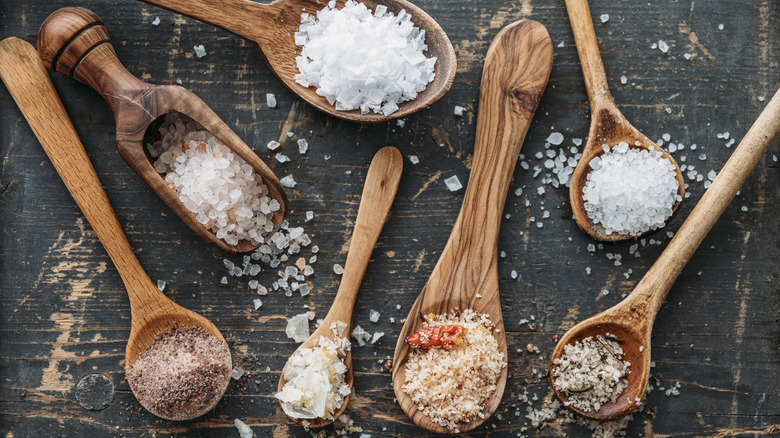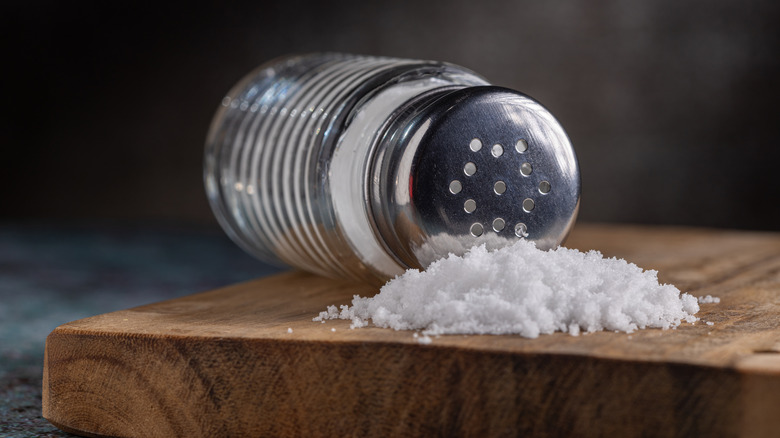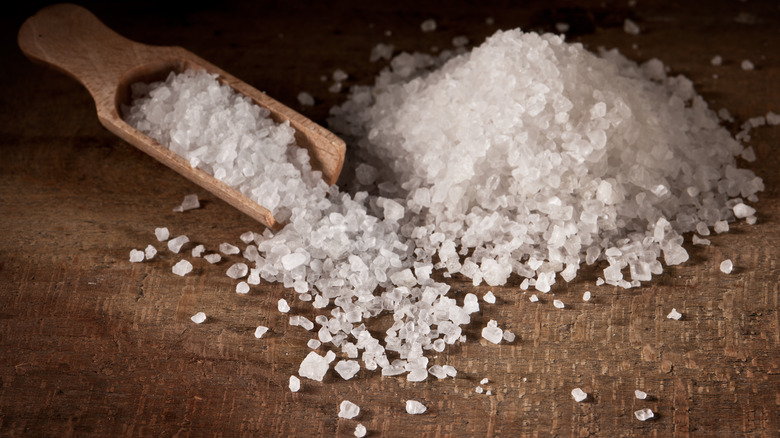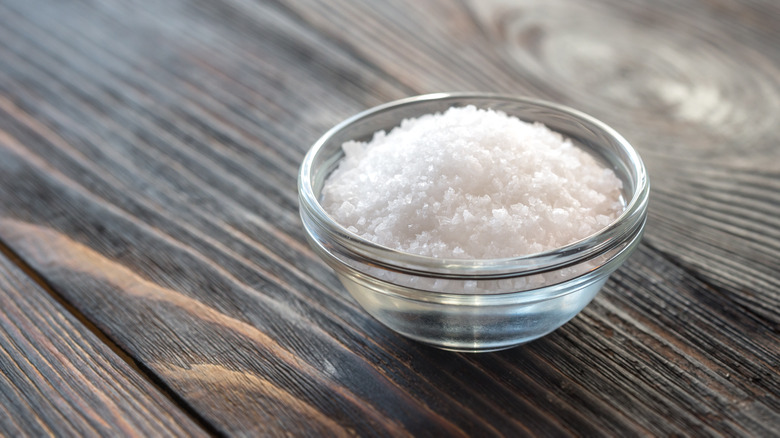Table Salt Vs Sea Salt Vs Kosher Salt: When To Use Each Type In Your Kitchen
It doesn't matter if it's the kitchen of an amateur home cook who barely uses the space or that of a professional chef, you'll be hard-pressed to find one that doesn't have a jar of salt somewhere. And that jar will most likely contain table salt, also known as "common salt." This fine-grained variety is super versatile and can be used for both seasoning and cooking just fine. But if you want to get the most out of your cooking, you'll need to expand your salt collection, stat. There are dozens of notable salt varieties; but to start, try adding sea salt and kosher salt to your pantry.
Each kind will be suited for a different purpose. For example, some work best for seasoning finished dishes, while others work much better as an additive to your baking doughs and batters. Curious about which one is which? Here's what you need to know about the best salts you should stock your pantry with: table, sea, and kosher salt.
Table salt is great for most applications
The salt you'll find sitting in those fancy glass shakers at restaurants and cafés is most likely table salt. Odds are good that the one you have in your kitchen right now is this type, too. Table salt is produced by blasting high-pressure water at underground salt deposits to reduce them to brine. It's taken up to the surface by a pipe and into a factory where it's dried. After going through several more processing steps, the results are tiny, dense salt crystals that — under a microscope — look like perfect little cubes.
Due to its density, table salt can pack quite a punch flavor-wise, so be sure to use a light touch when you add it to anything. Its density also means it's slower to dissolve, making it ideal for baking, as you can whisk the salt to distribute it evenly throughout the dough. And for recipes where not a lot of salt is needed (just a teaspoon to balance the flavor, for instance), you can get away with using table salt instead of the more expensive kinds.
Since the 1920s, most table salt has been fortified with iodine to ward off thyroid problems. Some people actively avoid it for this reason, claiming that it adds a metallic or bitter taste to their food. However, you'd need very sensitive tastebuds to discern the extra chemicals, so need to worry too much about it — shake away!
Sea salt for extra flavor
Sea salt, as its name suggests, comes straight from the ocean. Large puddles of seawater are left to bake in the sun, and once all the water has evaporated, flakes of salt appear at the bottom of these pools, ready for harvesting. Unlike table salt, sea salt doesn't go through a lot of processing steps, so it retains trace minerals like magnesium and calcium. These minerals give sea salt a complex flavor profile that sets them apart from all other kinds of salt — an earthy, briny undertone beneath the salty flavor. The unique flavor makes it an excellent finishing salt. A sprinkle of it to finish your steak, for instance, will add an extra layer of flavor on top of the smoky char.
Depending on where and how they're made, sea salts can take on different characters. Take Maldon salt as an example, whose salt crystals are crunchy, pyramid-like flakes that you can use to lend your food some texture. On the other hand, fleur de sel has smaller, more delicate granules that won't be as crunchy, but the delicate briny flavor that coats the tongue — thanks to the extra moisture within the salt crystals — is to die for.
Since sea salt can be expensive, most people use it solely for finishing dishes. But cheap sea salts like sel gris could be used as an all-purpose salt; it sure beats table salt in terms of flavor and flair.
Kosher salt for everything
Even though table salt is the most common, if you can only choose one type of salt to stock your pantry with, pick kosher salt. Think of it like a salty Swiss Army knife. Whatever task you have in mind — from cooking and seasoning a dish, to canning, pickling, and curing — kosher salt can handle it.
Compared to other kinds of salt, you'll find the kosher granules to be much larger and coarser (with no iodine added). It has this specific texture for a reason, which is rooted in Jewish tradition. The term "koshering" refers to the process of salting red meat to draw out blood before cooking, as Jewish dietary laws prohibit consuming blood. Kosher salt's larger crystals allow it to soak up more fluids.
For modern home cooks, its chunky texture makes it the ultimate salt to cook with (it's why Ina Garten loves it so much). The large grains mean you can grab and sprinkle more easily, giving you better control over your seasoning work. Plus, because it's less dense than table salt, you run lower risks of oversalting your food. But the best part is that kosher salt is very affordable, so if you haven't done so yet, now is as good a time as ever to stock up. Swapping table salt with kosher may seem like a small change, but trust us when we say that it'll make a big difference in your cooking.



